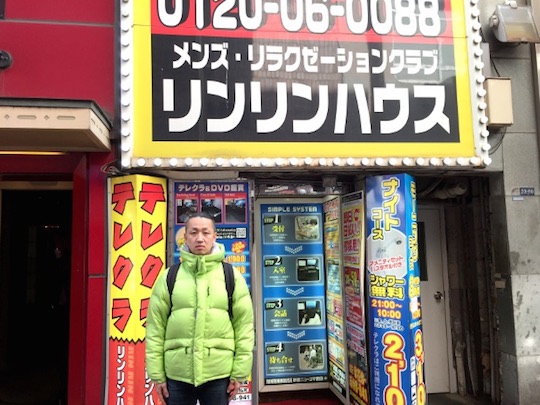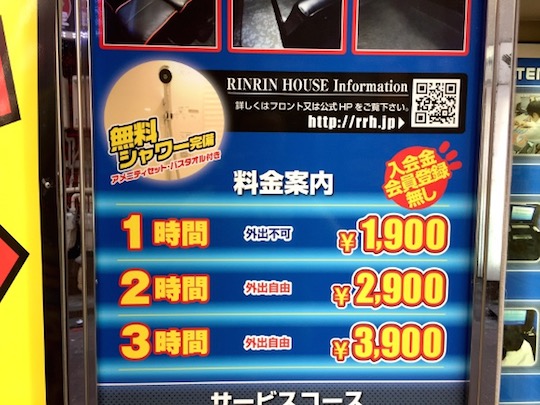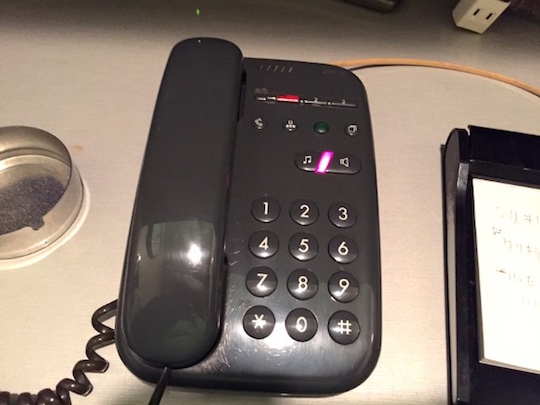We all like a no-strings attached kind of arrangement. So where to find Japanese ladies keen on this?
We just spotted this amusing photo report on a visit to a dating telephone club, or terekura, which were once commonly located in city neighborhoods as places where men could go to ring up women for dates.
These days terekura have been more or less replaced by deai cafes and online alternatives, where you can be introduced to ladies willing to do the business with you — for some compensation, natch.

The blogger went to a terekura in Kabukicho, one which I’m sure many of our readers have walked by over the years. It must be one of the last few remaining in central Tokyo.
Terekura exist, ostensibly, to facilitate meetings between men and women. However, they only accept male customers, who pay a few based on how long they want access to one of the facility’s phone equipped booths, to which calls from women seeking a match are directed. The terekura P.K. decided to visit, Rinrin House, charges 1,900 yen (US$17) for one hour of time, while two hours will cost you 2,900 yen and three hours will set you back 3,900.
The explanatory poster also explains that there’s a shower booth that’s free of charge, for those men who get particularly sweaty, or otherwise moist, from the excitement of talking to a woman over the phone.
The blogger pays tribute to the system, whereby he was directed to a booth for a fee and immediately greeted by someone on the other end of the phone.
However, no more than 10 seconds after P.K. has stepped into the booth, the phone began to ring! He picked it up, and was greeted by a cheerful voice that lacked even a shred of self-consciousness.
“Hi there! I’m 27, but is that OK with you? I’m nearby, so if you’re down for something with no strings attached, I’d like to get together. What do you say?”
P.K. was flattered and impressed by the woman’s forthcomingness, especially considering that not only had she never laid eyes on him, he hadn’t yet said even a single word other than “Hello.” But he wasn’t sure that he had the sort of bold personality required to mesh well with what she seemed to be offering, and so he politely declined. What’s more, customers at the terekura who ask for only the one-hour package don’t have in-and-out privileges, in the sense that aren’t allowed to leave the premises for a face-to-face meeting and then come back in, even if there’s time left on their hour.
In other words, had P.K. accepted this speedy invitation, instead of paying ¥1,900 for 60 minutes, he’d have been paying that price for 10 seconds (which, come to think of it, would be a great way to pump up a terekura’s per-booth hourly earnings, since if P.K. was no longer in the booth, it could then be rented out to someone else).
So is it all just a con? (If you pay for 2 hours or more, you are allowed to leave and come back.)
The intrepid blogger puts the phone down and waits for some more calls. One is morose and cold, another is older and keen to fall in love.


But then he starts to suspect that he is just being kept on the phone by a fake caller (a “sakura”, as they say in Japanese). These scams are notorious at deai sites.
Given her dubious grasp on the layout of the town she claims to live in, and the nebulous details of her self-professed hobbies, it seems like there’s a pretty good chance that Sachiko isn’t actually looking for a serious relationship, but is instead rotating between terekura customers all-day long and slipping into a new persona each time. As such, we have to conclude that a terekura probably isn’t the best place to find love, and also that you shouldn’t give your phone number out to strangers.
So just be careful. We reckon you are better off trying a deai cafe, which are sometimes foreigner-friendly and you are more likely to have a reasonable success rate.
